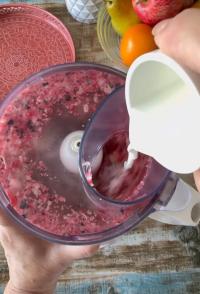Copy Link
Add to Bookmark
Report
Cider Digest #1068

From: cider-request@talisman.com
Errors-To: cider-errors@talisman.com
Reply-To: cider@talisman.com
To: cider-list@talisman.com
Subject: Cider Digest #1068, 20 August 2003
Cider Digest #1068 20 August 2003
Forum for Discussion of Cider Issues
Dick Dunn, Digest Janitor
Contents:
Re: Slow Food and ciders (Benjamin Watson)
Volatile acid (Andrew Lea)
Re: Commercial Cider Production (Dick Dunn)
FYM and Ross McKay's Contribution to CD #1067 ("Mike Thomas")
Cider by hand (Tim Bray)
Re: Cider Digest #1063, 8 August 2003 (Tim Bray)
Send ONLY articles for the digest to cider@talisman.com.
Use cider-request@talisman.com for subscribe/unsubscribe/admin requests.
When subscribing, please include your name and a good address in the
message body unless you're sure your mailer generates them.
Archives of the Digest are available at www.talisman.com/cider
----------------------------------------------------------------------
Subject: Re: Slow Food and ciders
From: Benjamin Watson <bwatson@monad.net>
Date: Sun, 17 Aug 2003 08:17:03 -0400
Gary Awdey wrote:
> I'm very glad that there is an organization like Slow Foods to promote
> traditions that might otherwise be lost (or at least unavailable
> except to a
> much smaller number of people). At the same time I'm glad there are
> programs like Cornell's Food Science & Technology that are taking a
> fresh
> look at basic assumptions about cidermaking.
I'm glad for Cornell, too, believe me -- certainly no one else in the
academic realm seems to be doing this kind of research into cider, and
like Gary I will be very interested to read the full study.
This is precisely why I wanted to let the Slow Food cider criteria (and
my own thinking) percolate through the brains of this Digest group. No
one person has a corner on wisdom, and we are all trying to
re-establish and to some extent re-define a cider tradition in this
country. I'd like to promote anyone who is making (or even trying to
make) well-made cider. On one hand, cider is ridiculously easy to make,
but as you get into it, like most things it is very difficult to make
really excellent cider. I know I find this at home -- as I learn more
and taste more, I am mildly dissatisfied with my own stuff, and try to
learn more, source better, pay more attention, and make it a little
better every year.
And that I guess is the point of Slow Food featuring "American craft
ciders" in the Ark of Taste. Not to imply that these are the only types
worth drinking, but that as a class these are interesting, well-made
modern examples of a centuries-old tradition. The ultimate goal is to
keep pouring these ciders to more and more people. In addition to Cider
Day in western Mass. Nov. 1-2, I will down in NYC on Sun. Oct. 26 at a
Slow Food "Harvest Festival" at the French Culinary Institute, where we
will have an open cider bar. And on Wed. Oct. 29 I will be helping
Peter Hoffman of Savoy restaurant to host a Cider Dinner, featuring
American ciders in cooking and accompaniment to foods.
I'm still optimistic. Some people do turn up their nose at cider that
they feel isn't "sweet" or "appley" enough, but I believe that all of
us are (ever so slowly) building up a cider culture in the US.
Finally, thanks as always to Andrew for setting me straight on
Brettanomyces vs. lactobacilli. I often rip off replies on this list
before checking my facts -- whether I know what I'm talking about or
not. It's good to have a chemist on hand to keep us honest.
Ben Watson
------------------------------
Subject: Volatile acid
From: Andrew Lea <andrew_lea@compuserve.com>
Date: Sun, 17 Aug 2003 20:20:15 +0100
Mike Thomas asked:
> I am new to this forum and to cider making in general. I was wondering
> if anyone could tell me how you can tell if the volatile acidity is too
> high, do you get a particular type of odour?
>
The odour is generally rather sharp like that of vinegar (due to acetic
acid) or more often 'solvent-like' due to the ethyl acetate which
accompanies the acetic acid.
It is actually acetic acid which is measured in the lab as 'volatile
acid', but ethyl acetate has a lower flavour threshold (i.e. is more
noticeable in the aroma).
Andrew Lea
- ----------------------------------
Visit the Wittenham Hill Cider Page at
http://www.cider.org.uk
------------------------------
Subject: Re: Commercial Cider Production
From: rcd@talisman.com (Dick Dunn)
Date: Sun, 17 Aug 2003 18:47:07 -0600 (MDT)
In CD 1067, Tim Taylor (aka 5585) asked:
> Is there any books or publications in print that would help me set up a
> commercial cidery?
This would be as good a time as any to mention that a recent revision of
_Fermented_Beverage_Production_, edited by Andrew Lea and Jean-Francois
Drilleau, just became available.
Andrew cautioned me that this book is pretty technical (although the cider
chapter is approachable by a person with moderate background) and that it's
_not_ a book for the amateur...it has an awful lot to do with the industry.
Nevertheless, if you're crazy enough to think you might want to do it for a
living, this book might help dissuade you...or if not that, make sure that
your ideas are more realistic than romantic.
Dick
------------------------------
Subject: FYM and Ross McKay's Contribution to CD #1067
From: "Mike Thomas" <MThomas@oldvalley.com.au>
Date: Mon, 18 Aug 2003 11:51:54 +0800
As someone who is involved in the commercial production of wine, fruit
juice concentrate and cider (as well as making home brewed beer and
cider) I would like to throw my two cents in on the subject of
Brettanomyces. My experience with winemakers in the Margaret River and
Swan Valley regions of Western Australia is that they regard
Brettanomyces as a defect and it tastes like "Band-Aid" plasters smell
(and a symptom of less than ideal cellar hygiene). This yeast is
becoming more of a problem as consumers demand red wines with a higher
pH. It is quite difficult to get rid of once it decides to move in!
I am at a bit of a loss to understand why people would want to make
ciders with "a rough country edge" my personal view is that increased
knowledge and understanding should create improvement in quality, after
all there does not seem to be much interest in making wine "with a rough
country edge"
Ross McKay was interested in pear juice yields. The company I work for
use a 5 tonne Bucher-Guyer press and we get a yield of around 820
litres per tonne. The Lalvin EC-1118 yeast variety that you used is used
commercially to make cider but as with all wine yeasts you need to be
careful that you don't have too high an initial SG or you will end up
with a brew which has 2 - 3 times more alcohol than you really intended.
We make cider with concentrate made from bittersweet varieties sourced
from France or New Zealand and this is purely to allow a consistent
quality product year-round and because there are not a lot of areas in
Australia where it is economically feasible to grow cider apples. We
also bottle pasteurise our products but mainly to avoid in-bottle
fermentation/spoilage and consequent exploding bottles. If you don't
carefully control the heating and cooling you can end up with some
really awful flavours.
On the home brewed cider front my interest is in making the sparkling or
petillant varieties that they make in France, I had some in Caen once
and it was great. Any suggestions on how to make this style of cider
would be gratefully received.
Mike Thomas
------------------------------
Subject: Cider by hand
From: Tim Bray <tbray@mcn.org>
Date: Mon, 18 Aug 2003 10:13:05 -0700
Charles wrote:
>Dick, you ought to try 'a la vollee' disgorging sometime. That's 'on the
>fly', and is done without freezing the neck of the bottle. Very low-tech,
>but very dependent on eye-hand coordination. Much fun - but messy :-)
Can you elaborate on this? I've done methode champenoise, and can't figure
out how it could work without freezing the neck. Sounds like a hoot, though!
Cheers,
Tim
------------------------------
Subject: Re: Cider Digest #1063, 8 August 2003
From: Tim Bray <tbray@mcn.org>
Date: Mon, 18 Aug 2003 10:33:30 -0700
Chad Brown asked:
>Is there anything in the flavor-producing process that is different with
>milling than without?
I would say yes - although it is hard to cite evidence, as I've never heard
of anybody pressing without milling! Also, certain traditional processes
include a "rest" of several hours wherein certain chemical changes begin to
occur. I think Andrew Lea's articles address this.
> Also, should apples be left sitting some time
>before pressing?
Definitely, in my experience. Particularly if you are using dessert apples
with high acidity. The fruit will 'mellow' with age, acidity goes down and
the juice gets sweeter. Also this provides a chance for any starch to
convert to sugar; unless you are growing your own, it is quite likely that
the apples will not be full-ripe when picked, and there will be starch present.
The best cider I made last year came from apples that rested (accidentally)
for about three months!
>Is there anything in cider comparing to the process of leaving the grape
>skins in the fermentation?
Yes, there's the "rest" step where the pulp is left to partly oxidize and
certain pectin reactions begin to occur. Very tricky, though;
contamination by fruit-flies etc. is hard to prevent, and acetification is
a likely result. I haven't been brave enough to try this myself.
> Would there be any flavors to be gained by adding
>skins or pomace to the fermentation, or would this just make it cloudy?
I'd think it would be a mess and unnecessary. OTOH, there is the
intriguing idea of adding apple _leaves_ in secondary, as we discussed
briefly a little while ago. I think I will try that this fall.
Cheers,
Tim
------------------------------
End of Cider Digest #1068
*************************



























